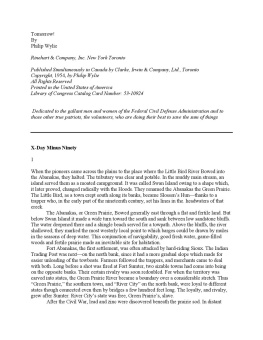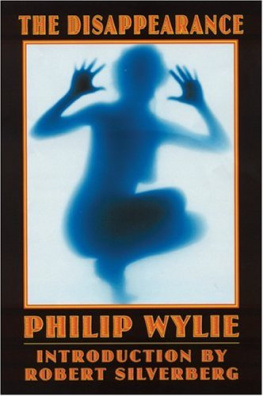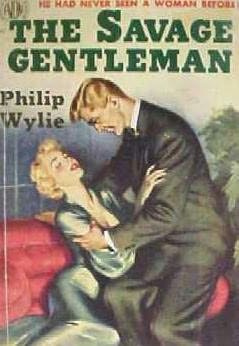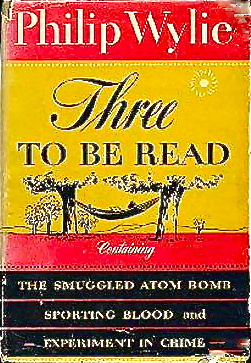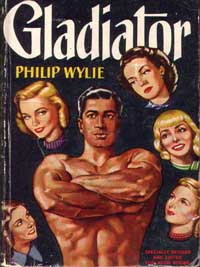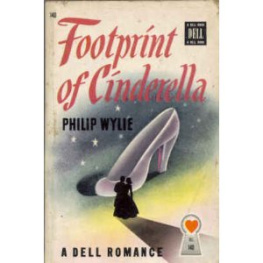Philip Wylie - Generation of Vipers
Here you can read online Philip Wylie - Generation of Vipers full text of the book (entire story) in english for free. Download pdf and epub, get meaning, cover and reviews about this ebook. genre: Science. Description of the work, (preface) as well as reviews are available. Best literature library LitArk.com created for fans of good reading and offers a wide selection of genres:
Romance novel
Science fiction
Adventure
Detective
Science
History
Home and family
Prose
Art
Politics
Computer
Non-fiction
Religion
Business
Children
Humor
Choose a favorite category and find really read worthwhile books. Enjoy immersion in the world of imagination, feel the emotions of the characters or learn something new for yourself, make an fascinating discovery.
- Book:Generation of Vipers
- Author:
- Genre:
- Rating:3 / 5
- Favourites:Add to favourites
- Your mark:
- 60
- 1
- 2
- 3
- 4
- 5
Generation of Vipers: summary, description and annotation
We offer to read an annotation, description, summary or preface (depends on what the author of the book "Generation of Vipers" wrote himself). If you haven't found the necessary information about the book — write in the comments, we will try to find it.
Generation of Vipers — read online for free the complete book (whole text) full work
Below is the text of the book, divided by pages. System saving the place of the last page read, allows you to conveniently read the book "Generation of Vipers" online for free, without having to search again every time where you left off. Put a bookmark, and you can go to the page where you finished reading at any time.
Font size:
Interval:
Bookmark:
NEWLY ANNOTATED by the AUTHOR
Generation of VIPERS
FOR THE 20th Edition OF THIS Explosive Classic Philip Wylie HAS SUPPLIED A Thoughtful Preface AND Iluminating Footnotes REFLECTING HIS current thinking ON WHAT HE CALLS A Survey of Moral Want A Philosophical Discourse SUITABLE ONLY FOR THE
Strong A Study OF American Types AND Archetypes AND A Signpost ON THE TWO
Thoroughfares of Man: the Dolorosa AND THE Descensus Averno TOGETHER WITH
SUNDRY Preachments, Epithets, Modal Adventures, Political Impertinences, Allegories, Aspirations, Visions AND Jokes AS WELL AS CERTAIN Homely Hints FOR THE CARE OF
THE Human Soul
PHILIP WYLIE
RINEHART &: COMPANY, INC. NEW YORK TORONTO
Published simultaneously in Canada by Clarke, Irwin & Company, Ltd., Toronto Copyright 1942 by Philip Wylie Copyright 1955 by Philip Wylie All rights reserved Printed in the United States of America Library of Congress Catalog Card Number: 55-6424
Generation of Vipers
Philip Wylie
I Catastrophe, Christ, and Chemistry
II Subjective Feudalism
III A Footnote to Chapter Two
IV A Psychology Lesson, a Study, and a Sermon
V A Specimen American Myth
VI A Specimen American Attitude
VII A Specimen American Institution
VIII Common Man: The Heros Backside
IX The New Order for Common Man
X Uncommon Men
XI Common Women
XII Businessmen
XIII Statesmen
XIV Professors
XV Congressmenwith a Footnote on Mecca
XVI Military Men
XVII The Man on the Cross
XVIII Conclusion
Introduction
SOME WHILE AGO MY PUBLISHERS INFORMED ME THAT THE TWENtieth printing of Generation of Vipers would soon go to press. They asked me if I would like to amend it in such a way as to bring it up to date. Vipers, as the book is called by its fans, was written thirteen years ago. It is not dated but it does exhibit the lapse of time: much that is mere prediction in the text as it stands has become history.
However, I feel that the re-writing of a book of opinion is a kind of cheating; it is not comparable, for instance, to the revision of a scientific work. What an author asserted in 1942 shows, in 1955, how wise (or foolish!) he was in the past; so he ought now to stand (or fall) on the fact of what he wrote then. The continuous revision of history to suit the insights or prejudices of the present is craven and nefariousan enterprise suited to characters in 1984 or to demagogues.
I told my publishers I would read Vipers (I had not read fifty pages in a decade) and thereafter, if any comments came to my mind, I would make themas footnotes. Somewhat to my surprise, it turned out that I wanted to add or to exclaim about something at fifty-odd points.
A number of these exclamations relate to the now-demonstrated accuracy of predictions regarded, at the time Vipers first appeared, as bordering on insanity. It is, of course, human (in a low sense of the word) to take pleasure in saying, I told you so. But I have a better reason for drawing attention to my record as a Jeremiah, which I shall explain later in this introduction.
Vipers has had and is still having a strange history. It was writtenI should say it was dashed off-between the twelfth of May and the fourth of July in I942. That was the year after Pearl Harbor. World War II had commenced. But the period of phony war prevailed in Europe, action in the Pacific had hardly begun, and the American people were apathetic. I had come home to Miami Beach after a stretch in government war informationill, discouraged and frustrated. This book represented private catharsis, a catalogue of what I felt to be wrong morally, spiritually and intellectually with my fellow citizens. Since it did not enter my head that millions shared my vexations and anxieties, that they would read the list and remark over it to this day, I did not makealas!that careful literary effort such an audience has the right to expect.
Indeed, my principal feeling on re-reading the book was one of regret that I had not gone over a hasty manuscript with patience and with care-to make it easier to understand, more definitive and better documented with the sources of theories and ideas. My publishers (then Farrar and Rinehart, now Rinehart and Company) reacted to the manuscript with some shock. I have since been asked, hundreds and hundreds of times, how I managed to get so much
criticism and truth published in America. The question has always discomfited me. It implies that a great many persons take it for granted that our country enjoys no actual freedom of speech.
It should be pointed out, then, that such haunted notions are false and disclose the very kind of fears which, if held widely enough, do lead to censorshipby general default.
While my publishers did not by any means agree with every contentious and dissenting opinion in my manuscript, they asked only that I delete one or two libelous passages and one scandalous item. I was not an important author to them in the sense that my past books had enjoyed large sales. But Stanley Rinehart and John Fatrar, for all the blood flowing from their personal icons, published my book without tremor or quibble. They knew it would mightily offend many highly placed individuals and many powerful minority groups. They thought, perhaps, (as I thought) that it might offend everybody. But they brought it out with utter aplomb and their usual skillin January of 1943. They did this, I might add, in the face of doubt expressed by some of their readers and the violent assertion (made by a famous liberal who was shown the manuscript) that the book was fascist and should be suppressed. My publishers, as much as I, were annoyed that a liberal would suddenly clamor for book suppression! The first edition was of four thousand copies, a number commensurate with sales of my previous books and one I thought high for the current treatise. Even before publication, however, I began to have an inkling of what was to come. An extraordinarily praiseful letter was written to Farrar and Rinehart by Taylor Caldwell, who had been sent a pre-publication copy. A wire also came from Earnest Hooton, the late Harvard anthropologist, which wound up: PUT OUT THE LANTERN OF DIOGENES FOR HERE BY GOD IN THE PLAIN LIGHT OF DAY IS AN HONEST MAN. And, on the Sunday before publication, Walter Winchell (with whom I had long labored in the Stop Hitler movement) highly recommended Vipers in his evening broadcast. The four thousand copies melted fast enough. The book has now sold more than one hundred and eighty thousand copies and its recent annual sales have approximated five thousand.
Criticisms were mixed but never neutral; reviewers went out of their way to commend the book or to seek terms of scorn that matched my own. The response of readers, however, was awesomeand remains so. This may be partly owing to the fact that I invited correspondence in the forematter of the book. People possibly hesitate to write to authors for fear of being snubbed by silence; if so, my casual invitation undid that restraint. In the first year after publication I answered more than ten thousand letters. They came from every sort of Americanfrom soldiers and sailors and marines overseas, from ministers of the Gospel and Middle Western farmers wives, from day laborers who read the book five times over with the help of a dictionary, from young people in college and high school, from moms and popsthe very people I had indictedfrom industrial tycoons and newspaper publishers and the presidents of banks, from college deans and generals and admirals, from Aldous Huxley and the late Harold Ickes and Hedy LaMarr. And more than ninety-five in every hundred
Next pageFont size:
Interval:
Bookmark:
Similar books «Generation of Vipers»
Look at similar books to Generation of Vipers. We have selected literature similar in name and meaning in the hope of providing readers with more options to find new, interesting, not yet read works.
Discussion, reviews of the book Generation of Vipers and just readers' own opinions. Leave your comments, write what you think about the work, its meaning or the main characters. Specify what exactly you liked and what you didn't like, and why you think so.


